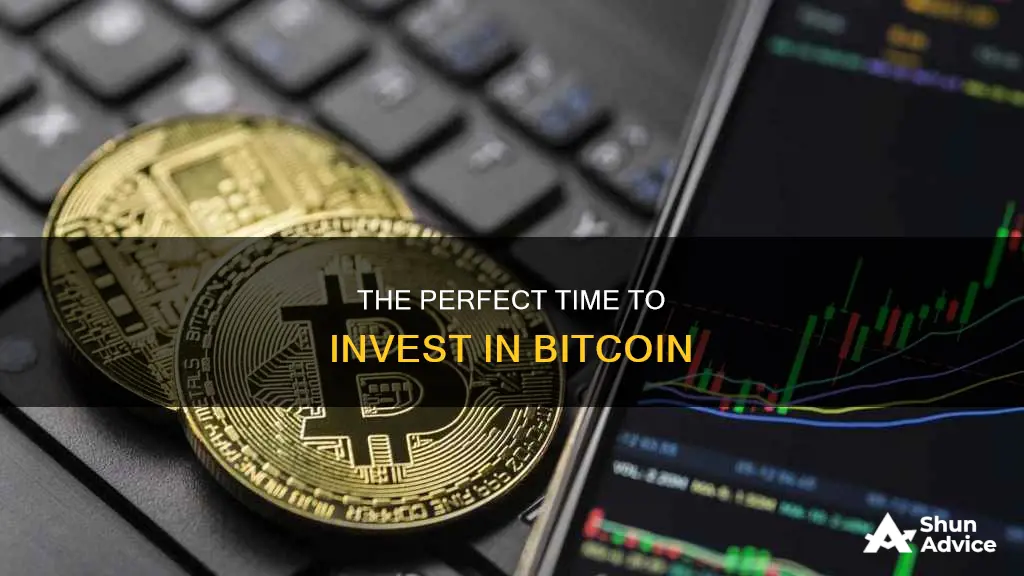
Bitcoin is a cryptocurrency with a difference. As the first of its kind, it has become the de facto standard for cryptocurrencies, with a legion of followers and spinoffs. But is it a good investment?
Cryptocurrencies are a highly volatile asset class that can experience significant price swings. This volatility is driven by market speculation, regulatory news, technological advancements, and macroeconomic trends.
So, when is the best time to invest in Bitcoin? Well, that's a tricky question. In an ideal world, it's simple: buy low, sell high. But in reality, this is easier said than done. One popular strategy is Dollar-Cost Averaging (DCA), where an investor regularly buys smaller amounts of an asset over a period of time, no matter the price. This helps to reduce the impact of market volatility.
The crypto market has already been making large moves in the first half of 2024, generating new all-time highs for Bitcoin. And with the potential for a new bull market, there is renewed interest in crypto investment.
But remember, timing the market is challenging, and while Bitcoin has experienced several downfalls, it has also emerged stronger each time.
| Characteristics | Values |
|---|---|
| Ease of buying | Relatively easy to buy |
| Currency and investment strategy | Offers an alternative currency and investment strategy |
| Risk | Highly risky and volatile |
| Hacking | Potential for hacks and other losses |
| Technical knowledge | Requires some level of technical knowledge |
| Buying options | Cryptocurrency exchanges, traditional stockbrokers, money transfer apps, Bitcoin ATMs, Bitcoin ETFs |
| Storage | Hot wallet or cold wallet |
What You'll Learn

Choosing a crypto-trading service or venue
There are several factors to consider when choosing a crypto-trading service or venue. Here are some key points to keep in mind:
- Reputation and Security: It is essential to research the reputation and security measures of the exchange. Look for reviews, security protocols, insurance policies, and compliance with regulations. For example, Gemini is known for its strong security framework, while Coinbase has faced issues with unexpected account closures.
- Supported Assets: Consider the range of cryptocurrencies offered by the exchange. If you plan to invest in lesser-known or small-cap crypto assets, choose an exchange with a wide variety of supported assets, such as BitMart or Crypto.com.
- Fees: Crypto exchanges typically charge trading fees, withdrawal fees, and other transaction fees. Compare the fee structures of different exchanges, as these can vary significantly. For example, Coinbase's fees range from 0% to 0.60%, while Kraken's fees start at 0.25% for makers and 0.40% for takers.
- Payment Methods: Check the payment methods accepted by the exchange. Most exchanges support wire transfers, but some also allow credit or debit card purchases. Ensure the exchange supports your preferred payment method.
- Customer Service: If you're new to crypto investing, consider choosing an exchange with excellent customer support. Read reviews and assess the responsiveness and knowledgeability of the exchange's customer service team.
- Geographic Availability: Not all exchanges are available in every country or region. Ensure the exchange you choose is accessible in your location. For example, Crypto.com is available in 90 countries, while Kraken is not accessible in New York or Washington.
- Advanced Features: If you're an experienced trader, look for exchanges that offer advanced trading options, such as margin trading, derivatives, and customisable alerts. Exchanges like Gemini, Crypto.com, and Kraken provide features tailored to advanced traders.
- Regulation and Compliance: With the recent collapse of FTX and ongoing regulatory issues in the crypto industry, it is crucial to select an exchange that complies with government regulations. Check if the exchange is registered with the Securities and Exchange Commission (SEC) and whether it has faced any legal issues.
- User Experience: Consider the user-friendliness of the exchange's platform or app, especially if you're a beginner. Coinbase, for instance, is known for its user-friendly interface, making it a popular choice for first-time crypto buyers.
Remember to conduct thorough research and compare multiple exchanges before making your decision. Each exchange has its own strengths and weaknesses, so choose one that aligns with your investment goals, risk tolerance, and level of experience.
Exploring Bitcoin's Potential: A Small Investment's Big Adventure
You may want to see also

Connecting your exchange to a payment option
Understanding Crypto Payments
Cryptocurrencies like Bitcoin offer a solid and secure payment method. Transfers between crypto wallets are instant and easy, facilitated by blockchain technology. Neither party has to deal with central authorities or the banking system, promoting safe and rapid transactions. Crypto payment gateways are often faster than traditional payment methods, though blockchain congestion can sometimes cause delays.
Crypto Payment APIs
Crypto payment APIs are facilitators for companies that accept crypto payments. When a user chooses Bitcoin as a payment option, the designated API is triggered. It bridges the merchant page to the buyer's decentralised wallet, releasing crypto funds to the seller's wallet. Crypto payment processing companies use smart contracts and other tools to interact with the blockchain and validate transactions.
Integrating Crypto Payments on Your Website
Integrating crypto payments on your website involves using a decentralised wallet and integrating it with a payment gateway. You can choose from pre-built or customisable gateways, depending on your preferences and user expectations. Customisable gateways allow you to change the layout, improve the payment experience, and add features like a scannable QR code.
Steps to Connect Crypto API
- Select a Crypto Wallet: Choose a valid wallet provider with enhanced security and improved usability. This is where you'll receive funds from clients and store your digital money.
- Find a Reliable Crypto Gateway: Register with a crypto payment processor to integrate your wallet and start receiving crypto payments.
- Choose Coin and Token Options: Select the cryptocurrencies you want to make available on your website, such as Bitcoin, Ethereum, Ripple, or Tether.
- Integrate a Gateway API: Generate a fully-fledged API build and crypto payment plugins that you can add to your online store. You can then start accepting crypto payments to your wallet address.
Benefits of Crypto Payment Gateway Services
- Lower Fees: Crypto transactions involve fewer intermediaries and centralised institutions, resulting in lower costs.
- Global Reach: Decentralised transfers help overcome restrictions associated with certain foreign currencies or payment options.
- Enhanced Security: Sending and receiving Bitcoin does not require providing private information, reducing the risk of identity theft.
- Quick Payments: With fewer intermediaries, transactions are faster and almost instantaneous.
- Business Growth: Crypto enthusiasts and DeFi communities favour platforms supporting decentralised transactions, so adopting crypto payments can enhance your reputation and expand your business.
Bitcoin Bubble Pop: Time to Invest or Run Away?
You may want to see also

Placing an order
Once you've chosen an exchange or brokerage, opened an account, and funded it, it's time to place an order. This is the fun part: buying Bitcoin.
To purchase Bitcoin, enter the amount of Bitcoin (BTC) you want to buy in your exchange's trading tool. You will need enough of your local currency for the transaction to go through once you click the button to submit.
Bitcoin transactions occur instantly on some exchanges, while others may process a transaction on the Bitcoin blockchain that takes some time to complete. Standard Bitcoin transactions require four confirmations and take about 40 minutes to complete, according to the exchange Kraken. However, you can choose to pay higher transaction fees for faster processing times with some exchanges.
When you think the moment is right, click the buy button to enter an order. The exchange will turn your dollars into Bitcoin, stored in the same cryptocurrency account, similar to holding stocks in a brokerage account. Once your trade executes, you are officially a Bitcoin owner.
If you're using a decentralised exchange, such as Exodus or Bisq, you will connect with third-party buyers or sellers directly.
How Much to Buy
You don't need a lot of money to invest in Bitcoin. At Coinbase, for example, you can buy as little as $2 of Bitcoin at a time. If you'd like to test out investing in Bitcoin with a small amount, perhaps $10 or $20, that's certainly an option. You don't need to be wealthy or have a lot of money to invest in Bitcoin.
Where to Buy
There are several places to buy Bitcoin, including:
- Cryptocurrency exchanges, such as Coinbase, Robinhood, eToro, FTX, Gemini, and BlockFi.
- Traditional stockbrokers, such as Robinhood, Webull, TradeStation, and Fidelity.
- Money transfer apps, such as PayPal, Venmo, or Cash App.
- Bitcoin ATMs.
- Bitcoin exchange-traded funds (ETFs).
Bitcoin: Currency or Investment?
You may want to see also

Safe storage
Firstly, it's important to understand the difference between hot wallets and cold wallets. Hot wallets are online wallets, such as apps on computers or phones, which are connected to the internet. They are best for small amounts of cryptocurrency or cryptocurrency that is actively trading on an exchange. However, hot wallets are susceptible to hacking and theft, so strong passwords, two-factor authentication, and safe internet browsing are essential.
Cold wallets, on the other hand, are offline wallets that are not connected to the internet. They are considered the safest and most secure way to store your Bitcoin. Examples of cold wallets include hardware wallets, paper wallets, and cold storage solutions using general-purpose computing hardware.
When using a cold wallet, it is important to keep your private keys secure and to back up your wallet. Private keys should be kept secret, as they allow users to authorise transactions. Additionally, creating multiple public addresses and distributing your Bitcoin collection across these addresses can enhance security.
- Hardware wallets: These are physical devices, such as the Ledger Nano X or TREZOR, that store your Bitcoins in a hardened, highly secure device. They are designed to be resistant to viruses, hackers, and keyloggers.
- Paper wallets: Paper wallets involve printing your private wallet keys on a piece of paper for offline storage. However, this method is susceptible to physical damage, theft, or loss. It is recommended to laminate the paper and store it in a safe deposit box or a safe.
- Cold storage solutions: This method involves setting up an offline computer that is not connected to the internet and installing Bitcoin wallet software on it. You can then generate a wallet and write down its seed phrase on paper or another medium. This approach protects your Bitcoin from online threats but is still vulnerable to offline threats such as hardware keyloggers or physical theft.
- Secure online storage: If you choose to store your Bitcoin online, use a reputable exchange or brokerage that offers secure storage solutions, such as Coinbase, Robinhood, or eToro. These platforms typically have security measures like two-factor authentication and encryption to protect your Bitcoin. However, even these platforms can be hacked, so it is wise to consider diversifying your storage methods.
Why You Should Consider Investing in Bitcoin Investment Trust
You may want to see also

Understanding the risks
Bitcoin is susceptible to certain forms of hacking, which is why it’s important to keep your digital currency accounts extremely secure. If someone gets hold of your Bitcoin wallet address and password (private key), they can take your Bitcoin and you likely won’t be able to recoup your losses.
If you keep your Bitcoin offline, it’s essential to keep your access information secure and available, as losing your wallet information could lock you out of your currency.
The price of Bitcoin is highly volatile. As of November 6, 2018, one bitcoin was worth $6,461.01. If you happened to purchase a bitcoin on December 17, 2017, the price topped $20,000. Days later, on the 24th, buyers could not sell their investment for more than $14,626. With such an unpredictable market, there’s no telling if you will get a return on your investment.
Bitcoin is also susceptible to government actions and could be made illegal or severely limited, as recently happened in China.
The lack of a centralised authority can be a legal and financial risk to cryptocurrency owners. The regulation of cryptocurrencies remains in an unsettled state. The wise cryptocurrency investor should consider reporting their holdings as foreign assets, although the requirements remain unclear.
Cryptocurrency is technology-based, which leaves this investment open to cyberattacks. Hacking is a serious risk, since there is no way to retrieve your lost or stolen bitcoins. Many reports suggest that many buyers lose their investments on exchanges and mining losses. Exchanges are more likely to be hacked, even if you have the protection of a smart wallet.
In addition to hacking, there is a fair amount of fraud in the bitcoin market. Buyers and sellers are looking to trade bitcoins online, but since their rise in popularity, some of these exchanges can be fake. The Consumer Finance Protection Bureau and the Securities and Exchange Commission have warned against these transactions where unsuspecting investors are duped out of their bitcoins in fraudulent exchanges. This lack of security creates a big risk for investors. While systems have been created to deal with these problems, security remains a big issue.
Bitcoin may be referred to as a Ponzi scheme, with people at the top benefiting from the ignorance of others. As more people buy into bitcoin, it creates a bubble economy. When the bubble bursts, bitcoin will essentially become useless; there will be many people holding onto cryptocurrency, intending to sell but unable to unload. There is no return on the investment, which can equal a very painful financial loss.
Is Bitcoin a Good Investment Option?
You may want to see also
Frequently asked questions
You can buy Bitcoin through a cryptocurrency exchange, brokerage, or another account with Bitcoin support. Examples of dedicated cryptocurrency exchanges include Coinbase, Gemini, Kraken, and Binance. You can also buy Bitcoin through other financial and brokerage accounts, such as Robinhood, SoFi, and the Cash app from Square.
While the value of a single bitcoin may be in the tens of thousands of dollars, you don’t need nearly that much money to invest in Bitcoin. For example, at Coinbase, you can buy as little as $2 of Bitcoin at a time.
The best way to invest in Bitcoin depends on your goals. Some speculators may be happy with an account that makes investing in bitcoin easy, even if it requires higher fees. Some may want to buy and hold on for long-term appreciation, while others prefer frequent trades to capture profit from smaller day-to-day price fluctuations.
Bitcoin can be stored in two kinds of digital wallets: a hot wallet or a cold wallet. With a hot wallet, transactions are generally faster, while a cold wallet often incorporates extra security steps that help to keep your assets safe but also make transactions take longer.
There are many risks involved with investing in and using bitcoins, including volatility, fraud, and theft. Bitcoin is also susceptible to certain forms of hacking, which is why it’s important to keep your digital currency accounts extremely secure.







